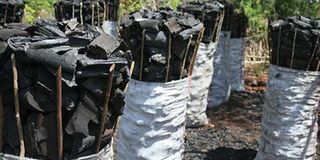Why sustainable charcoal production is key to forest conservation

Dar es Salaam. Charcoal is the main cooking fuel for urban populations in many African countries. Urbanization and population growth are driving an increase in demand for charcoal, whilst deforestation reduces biomass stocks.
Given increasing demand for charcoal, and decreasing availability of biomass, policies are urgently needed that ensure secure energy supplies for urban households and reduce deforestation.
There is potential for charcoal to be produced sustainably in natural woodlands, but this requires supportive policies.
Previous research has identified policy issues that have contributed to the charcoal sector remaining informal and environmentally destructive.
Over 1,200 communities in Diguzi Village, Morogoro have improved their socio-economic status through sustainable charcoal production and timber levies under a project dubbed “Transforming Tanzania Charcoal Sector (TTCS).
The plan implemented by Tanzania Forest Conservation Forest Group (TFCG) in collaboration with the Tanzania Community Forest Conservation Network (MJUMITA) has helped to turn around the lives of 1,367 who now have better income.
Through the project local residents received training on conservation of agriculture, sustainable charcoal production as an alternative source of income and reduction of deforestation.
Diguzi organizing Chairman Mr Amini Dico says through sustainable charcoal production they have managed to collect Sh66 million from timber and charcoal levies from during 2018/19.
“We have also opened an account and deposited some of the money collected from charcoal and timber levies. Currently we are constructing a three bedroom house for the school headmaster, we have bought 50 desks for the school and solar energy equipment for dispensary,” he said.
According to him, through the project at Diguzi Village, villagers have also teamed up to establish a saving and lending scheme which has enabled to transform lives and communities within the area.
Mr Dico says they are optimistic that 2020/21 they would collect more than Sh66 million from sustainable charcoal production and timber levies.
He says that even if the government does not disburse the Sh50 million to the Local Government Authority they would still be able to run their affairs smoothly.
“Currently, the biggest support we want from the government is capacity building to some members of the communities to understand adopt the sustainable charcoal and conservation of agriculture because most find it hard to adopt the system,” he said.
Mr Dico also notes that the number of women involved in charcoal production has also increased compared in the past when women did not participate in such activities.
Miriam Rashid 58 is grandmother of three grandchildren who has benefited from the initiative and as a result she can afford to pay school fees for her grandchildren.
Ms Mariam who stays with her three grandchildren after losing her only daughter says before she acquired training she used to move from one household to another in search of piecework in order to earn money to feed her grandchildren.
“Before I received the training, life was extremely difficulty, there was a time when I failed to look for piecework because sometimes I could get tired and a rest this, made my grandchildren to go to bed with an empty stomach,” she said.
According to her, the training has brought positive results to her as she is able to cultivate sorghum and maize for both consumption and selling
By selling some maize and sorghum managed to raise some funds and now she has joined the village community Bank (VICOBA) where now she has access to low interest loan.
Mr Deodatus Mfugala is a consultant and he says it is important for government to consider alternative ways of conserving forests especially with the current drive towards industrialization..
According to him, most people use charcoal for cooking because it is the cheapest source energy that every household can afford.
“For instance a person with low income prefer to use charcoal than gas because all they need is between Sh500 and Sh1000 to cook for a family meal unlike gas which requires thousands of shillings to buy a gas cylinder,” he said.
TFCG says their mission is to reduce poverty in rural communities and conserve the biodiversity of globally important forests in Tanzania for the benefit of the present and future generations.
“We achieve this through capacity building, advocacy, research, community development and protected area management, in ways that are sustainable and foster participation gender equality and partnership.” She said.
TFCG communications officer Bettie Luwuge says facilitating women’s participation in forest user groups, improving their access to modern sources of energy, and enhancing their access to processing techniques and markets have been found to make a major difference in the livelihood of people living Diguzi village, Morogoro.




